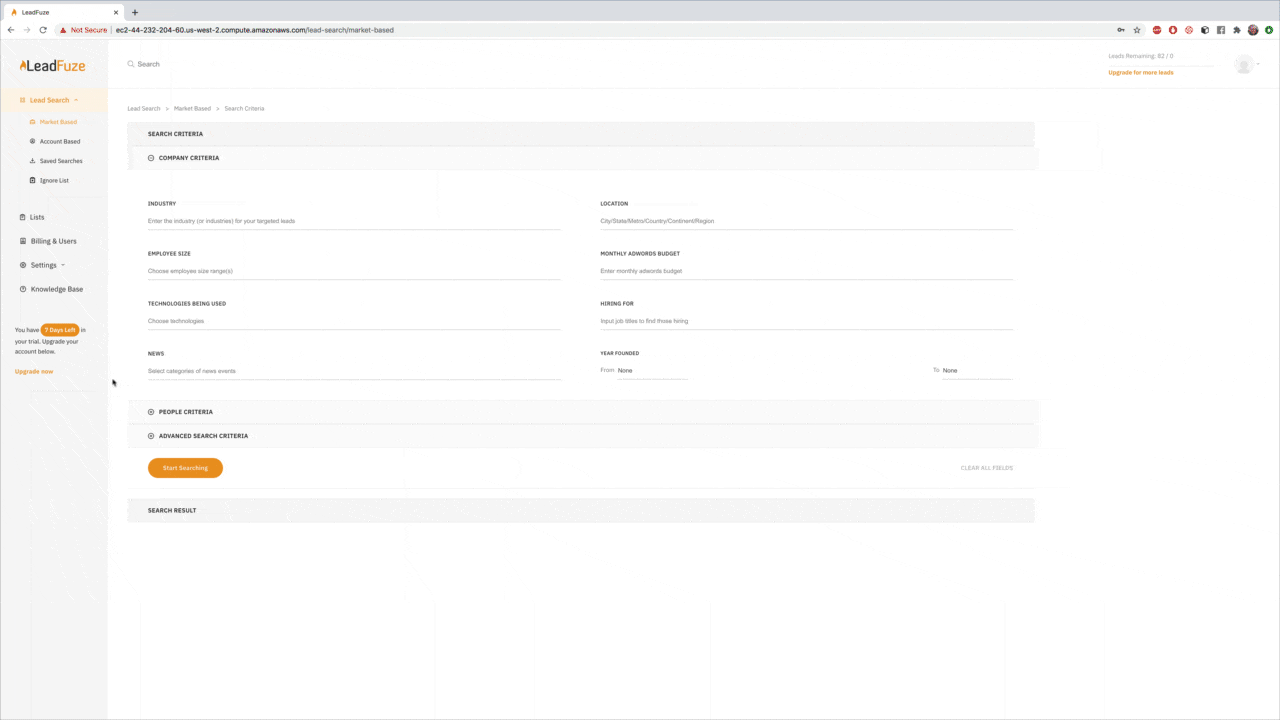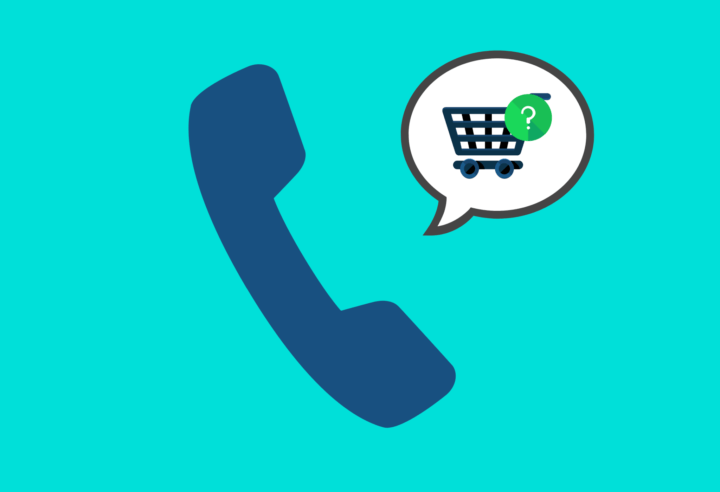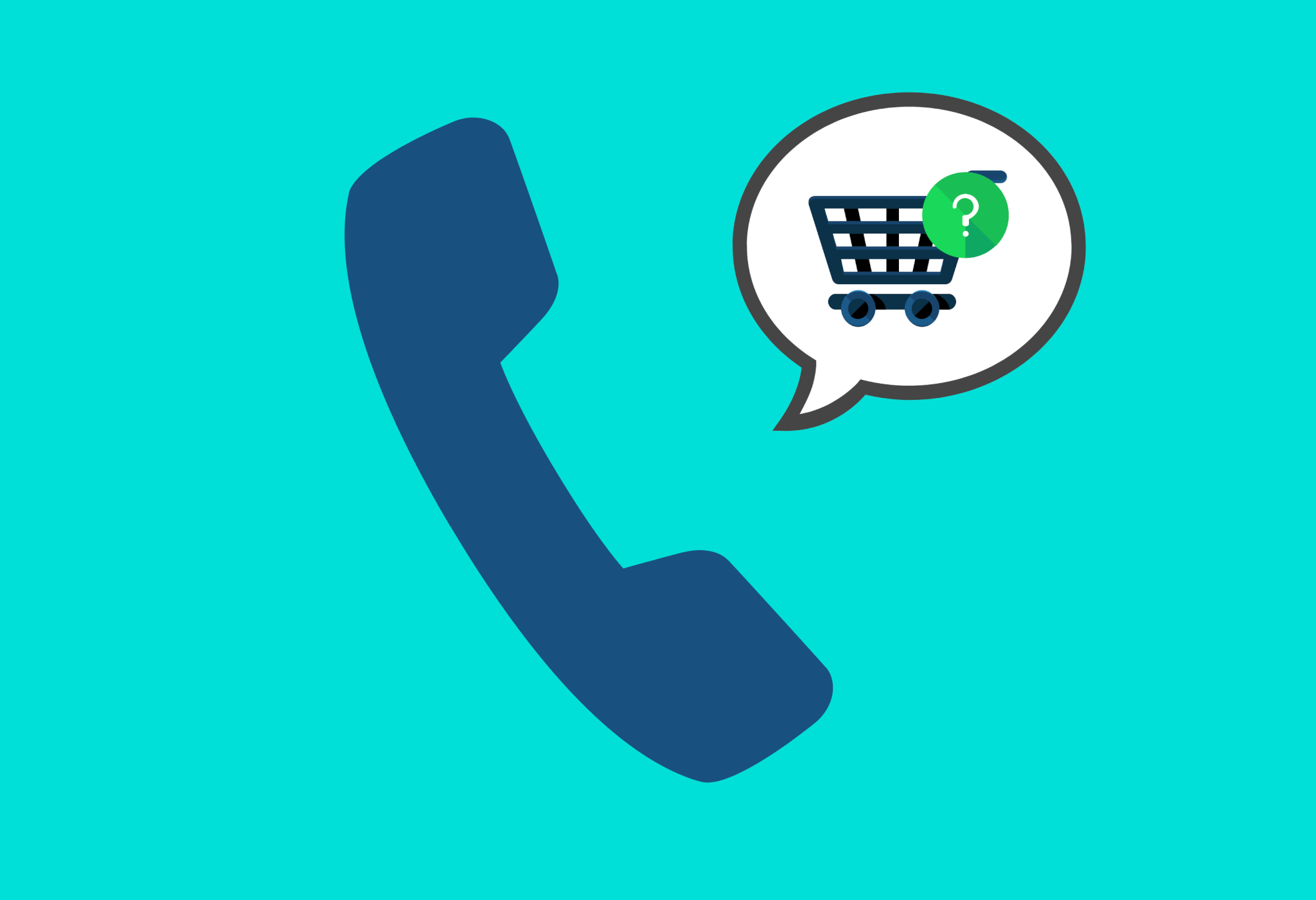How to Collect Prospects Before Making Sales Calls
Before knowing the sales questions to ask on a sales call and before you do it, you should have a list of leads first. And LeadFuze can help you in that regard.
LeadFuze is a software solution that helps you build lists of accurate leads automatically while integrating with sales outreach tools to allow you to contact those freshly verified leads.

Here are some benefits you can enjoy when you use LeadFuze:
- Building a list of leads is automated on LeadFuze. With Fuzebot, an AI-powered assistant, you can build your list accurately and effortlessly. All you have to do is key in your preferred criteria on Fuzebot and it’ll search the Web for potential clients. Moreover, you can avoid duplicate entries by telling the bot to ignore existing contacts.
- It has integrated outreach tools. This means it can be synchronized with different email outreach software like Mailshake. With this feature, you can send emails to everyone on your list without entering their details manually.
- LeadFuze provides double verified emails. Yep — all the leads you get are verified twice. Therefore, you’ll experience zero email bounce.
- It allows you to perform market and account-based lead searches. This way you can ensure that the leads you find fit your criteria. Most importantly, it can provide you detailed information about your prospects. Some details you’ll get are their hiring intent, technologies, phone numbers, emails, and others.
5 Tips on How to Start a Sales Call Over the Phone
Perhaps you’ve received a sales call before where the salesperson on the other end of the line started very casually. They’d usually ask “How’s it going?”

There’s nothing wrong with it. The only problem is they’re overused sales questions to ask customer that may sound scripted. Your leads would instantly know you’re doing a sales call.
When you’re pleasant but predictable, you lose your chance to build rapport with your prospects. You only have limited time to create a connection with them, so make sure you don’t waste it on an empty filler.
Instead, say something that’s much more effective. Ask your high gain questions.
For getting favorable responses and getting them converted into leads, sales call need to be made on certain days and times.
According to studies, it takes an average of eight calls to make someone agree to talk with you on the phone. Therefore, you shouldn’t waste the opportunity by asking shallow questions such as “How was your weekend?”
Make your approach memorable. That way, they’d be more inclined to talk to you and even remember you after the call.
Your choice of initial sales call questions will affect the rest of the conversation. That’s why it’s important to learn how to open a call to keep your prospects intrigued and listening. Prepare your sales questionnaires in advance and study them.
Here are five tips on creating your discovery questions to open a call:
1 Greet them warmly
Not everyone likes engaging in unexpected calls. But if you greet them like an old friend, they might reconsider.
You can start the call by saying: “Hello [Name], how have you been?”
Calling them by their name will create a sense of respect and familiarity.
Sure, “how are you” is a good greeting, but “how have you been” is superior. With these top sales questions, the prospect will start thinking if they’ve met you before. Thus, it gives you a great opening to the conversation.
However, make sure you get to the point after your warm greeting. You don’t want them to view your approach as a misdirection. That’s one of the first thing to keep in mind when making questions to ask a customer.
2 Show your interest
Yes, a warm greeting is essential. But remember they wouldn’t stop on their tracks just because of your personalized greeting.
To make them listen further, mention the research you’ve done about their company. As you can see sales questionnaires without being anchored to research may not be so useful.
You can say something like this:
“My research about your company shows you’re in the process of…”
Make them feel you’re really interested, and you’ve done your research before hopping on a call with them.
Moreover, they won’t feel like you’re trying to sell them something right away.
3 Talk about a mutual connection

Bringing up the name of a mutual connection can increase your credibility. It’s one of the elements of a top sales questions to ask potential clients. You can continue the conversation by saying:
“One of my clients, [Name] at [Company], mentioned to me you are [a good fit for, looking for…]
This will pique their interest and they’d be curious on why a mutual contact thought that they might need your service.
4 Mention information from their LinkedIn profile
There are many valuable things you can find on your prospect’s LinkedIn profile. It could help you construct the high gain questions you need to ask.
You can tell them something along the lines of:
“I visited your LinkedIn company profile and saw one of your major projects this year is…”
By using their LinkedIn profile as your reference in your customer questions, they’d see how interested you are in discussing something of value to their brand instead of pushing your services into their faces.
5 Come up with a personal question ice-breaker
It’s important to have some icebreakers as those can help you to size up your prospective client.
Try to look around the office. Find personal touches like certificates, awards, hobbies, family photos. This could help you create witty questions to ask a customer.
Choose something you can relate to and bring it up in your selling questions.
You can say “I see your fishing photo there. I go fishing every weekend. Do you go often?”
With these type of customer questions, you can narrow down their mood and personality.
29 Must-Ask Sales Qualification Questions
Now it’s time to up your game learning the right sales question to ask on a sales call. With these proper sales questions to ask customer, you’ll get the information you need when it comes to lead qualification.
Here are 29 open ended questions to ask customer on your next discovery call to better qualify your leads:
1 How long have you been in this business?
Asking about the length of time in business can give you an idea of stability. Good business questions will help you get the answer that you need when it comes to this aspect.
2 What’s the size of your organization? (e.g. revenue, number of employees, number of customers)
The needs of a start-up company will be way different from the needs of an established enterprise.
3 What are the top challenges your team or company is currently facing?
Remember that your prospects don’t care about your products or services initially. All they’re thinking about is how they can tackle their challenges. That’s why you need to be prepared to throw selling questions that focuses on that.
4 What are the top challenges you’re currently facing?
Yes, the needs of the company are important. However, take note you’re trying to sell your services to a “group of individuals.” Failure to recognize an individual’s needs during discovery call questions can lead to a delayed deal.
5 What are the results you want to achieve and how do you want to achieve them?
Dig deeper into their problem. This could be one of your great business questions. If they’re having trouble with lead generation, you can pitch how your solution can provide them a list of verified leads.
6 When would you like to achieve these results?
Your prospective clients may have a specific date in mind. The closer the due date is, the faster you can close the deal. This is definitely a need question that should be asked by every saleperson.
7 How would achieving these results benefit you, your team, and your company?
Having a solution to their problem can bring them positive emotions. It would make them feel more excited about working with you.
8 What would the consequences be if you didn’t solve these issues?
If you highlight the consequences, you’d create a sense of urgency.
9 What motivated you to search for a solution now?
Prospects who have experienced major events in the company like a change in leadership or market would most likely be interested in a solution.
10 If you’re not currently searching for a solution, why not?
Find out the reasons why they’re not searching for a solution. It can be because they don’t think your solution is a priority, they don’t have a budget, or are already using a competitor’s product.
11 Which features are must-have versus nice-to-have?
You may have what they want, but you don’t have what they need. It’s important to know their priorities.
12 Why do you need these particular features?
By asking these type of great business questions, you’d know if the features they need are deal-breakers. Or maybe you can use a workaround.
13 What role do you play in the decision-making process?
It’s simple: Through these good business questions, confirm if you’re actually talking to the key players — ASAP!
14 Who are the people who have the final say in making a decision?
If it’s a big enterprise, chances are, there are many decision-makers in the company you have to deal with. Make sure that you find out who gets to say the final decision through your discovery call questions.
15 What concerns will these decision-makers likely have?
Ask what can attract or repel those decision-makers from your solution. This way you can avoid costly and embarrassing mistakes.
16 How does your company or department make decisions?
Knowing who decides is important, but you also need to know how they decide. If you can catch the interest of many stakeholders, you can increase your chances of making the deal happen. Make sure that you make use of this need question when doing a sales call.
17 Which departments are involved?
If you’re selling to large organizations, you must know who is involved in finalizing the contract.
18 How much time did it take your company or department to buy a similar product?
This can help you estimate how long it’d take to close the deal. For long timeframes, you can ask about possible delays in the process you can work on.
19 Which metrics would you use to evaluate the success of my solution?
They’ll judge your solution — that’s inevitable. So make sure you know their metrics to establish an understanding of both parties.
20 Who oversees the budget?
You may have the answer to this question when you asked about the decision-makers and decision-making process. But if you still haven’t identified the person or department who oversees the budget, now’s a good time to ask.
21 How much is your budget now?
Know how much they’re willing to spend on the solution you offer.
22 Do you currently have a contract with another company? If so, when is it up for renewal? Is there a cancellation fee?
If they currently have a contract, you have to work on convincing them to make the switch. However, if they’re not interested, you have to be patient and do regular follow-ups.
23 What were the deciding factors that made you choose that particular solution?
Sure, the present is important. But asking them about the past can be very useful. This way you’d know if they had positive or negative buying experiences.
24 Are you considering building your own solution?
Some prospects may think they’re better off building their own solutions, especially if they’re also developers.
25 How does our solution compare to the competitor’s solution?
These days, prospects are very much aware of the options they have in the market.
26 What are all the steps we have to take to help make this deal happen?
This is simply asking them how you could turn them from a prospect into a client.
27 Are there any obstacles that could prevent this deal from happening?
If you know all the potential roadblocks, you can be proactive instead of reactive.
28 Based on what we’ve discussed, do you think our solution is a good fit for your needs? Why?
At this point, it would be clear to you if your prospect is qualified. Now’s your chance to re-confirm their interest and handle any objections.
29 What is the best date and time to schedule our next meeting?
Ask them about the time and date that works for them while they’re still on the line with you.
9 Best Open Ended Sales Questions to Ask on a Sales Call
Open ended questions are perfect for prompting a conversation because it requires an elaborate answer.
Here are some open ended cold call questions to ask your prospects:
1 What are your top [business/industry] priorities right now?

Still in rapport-building territory here, but you’re starting to switch things into the right place. You should also start with your client needs analysis questions.
Finding where a decision maker’s head is can be a huge indication of how likely they are to buy in the near future.
If you ask these type of questions that sell and they tell you about some focus that has nothing to do with your solution—it could be a short call.
If their priority is one of your product’s features—jackpot.
Potential Follow-up: Do you have a current solution for this issue?
2 Are you having problems with [insert a couple of pain points] like some of our other clients?
If they weren’t forthcoming with anything related to what you’re selling, it’s time to throw out some bait.
Just ask them if they are having the common pains as others in the same industry.
When they answer; it’ll either be a ‘yes’ that you can dig into or a ‘no’.
Either one is good for you.
This is really the first meaty questions that sell. Through these best either or questions you’ve built up a bit of a connection and this one will tell you if it’s worth going forward or not.
Potential Follow-up: One of the best follow-up questions ever— “Can you tell me more about [insert the pain mentioned here]?”
3 Is your current solution not solving these as well as you would like?
Your lead likely has some sort of solution already.
That’s like hard ground that you’ll have to dig up to lay the foundation for the new product.
This type of consultative selling questions help with this problem.
It’s also great for gauging how loyal they are to their current tool/service.
If they aren’t going to budge, it’ll likely come out here.
Listen closely to see if you can start to pry it loose in their mind. If not, you may want to move on.
Potential Follow-up: What made you choose this provider?
4 What would it do for your overall revenue/workflow/pain benefit if you could handle these issues more effectively?
Once you’ve seen a window for getting them to switch, it’s time to start gathering intel that will be used to close the deal.
The goal in these sales rep survey questions is to tailor the “perfect world” you want to paint in order for the lead to pull the trigger.
You know what they want, but some aspects may be more appealing to the prospect. It’s important to pay attention here to highlight those benefits in the future.
Client needs analysis questions are usually needed to be given.
Potential Follow-up: What would be the biggest difference for your role personally?
5 How does the decision-making look for a solution like this?
Pains, priorities, and roles are usually similar from one lead to the next. But buying processes are a different story.
Fiscal year and budgets are always different, a buying team may need to be constructed, varying levels of organization (or disorganization) exist.
There is no telling how long it may be before a lead, even if interested, would actually buy your gizmo.
But that’s why we ask the question, right?
Potential Follow-up: What are the specific steps in that process?
6 What concerns do you have about switching/implementing a new solution?
Just because they’ve made it this far doesn’t mean they want to switch.
The lead may not even like their current solution, but just don’t want to deal with the buying process they’ve just laid out—let alone implementing a totally new product.
All of these are barriers that will be thrown up sooner or later. It’s better to get them talking about it now. Let out your challenger sales question to ask potential clients.
Pay close attention here, this is one of the last lines of defense many leads have before making a decision.
Potential Follow-up: Would any of those keep you from buying, despite finding a better solution?
7 How comfortable are you with saying no to me?
We have to give credit where it’s due. John Barrows wrote a piece for Sales Hacker and included this consultative selling questions (among others)—and it’s genius.
So many leads have no intention of buying but will sit on the phone with you and sound interested.
They’ll politely answer your sales rep survey questions and then, when you ask them to set a time for a future call—they say yes!
You get excited and when the time for the call comes…crickets. Let them know that you want to figure out if their brand is a fit. If yes, great!
If not, that’s great too. At this point in the convo, they’ve heard you enough to know. The sooner they’re gone the better if it wasn’t going to work.
Potential Follow-up: Seriously, just let me know if you’re not interested—ok?
8 What if we could set up a strategy call to explain how to implement and use our [product/service] for the maximum benefit?
If the call and sales needs assessment gets to this point, you have enough data to give to the closer (or use yourself) to get the deal.
Prospects will have shown themselves by now and it’s time to set a sales-qualified appointment (SQA).
If they’re a suspect (not interested in buying), they’ll probably run scared at this point. A question like this isn’t a softball, but it’s time to get a demo on the books.
Potential Follow-up : Would you have [insert typical demo call length] to potentially solve the [insert pain] we talked about?
9 Will you give us a firm answer?

If you’re really feeling lucky, go for it. Use challenger sales questions. Ask for a committed answer at the end of the demo.
Someone would be naive to think they weren’t going to be hard-pitched on the next call.
Asking if they’ll commit, either way, sets the tone for your closer. It’s also the last protection against those who aren’t qualified to go to close.
This is the equivalent of a chicken exit. If they’re not ready to plunge—they’ll get off the ride.
3 Rapport Building Questions to Ask
Rapport building questions can make or break a sales call. Here are some building rapport questions you can use:
1 “I see you live in [City]. What’s your commute like?
Asking your prospect location-based questions during a consulting sales call can show them that you know something about them.
Come up with a relatable situation like heavy traffic (because who doesn’t hate traffic jams on the way to work?
Additional questions:
- Have you visited [local attraction or restaurant]? I’ve heard good things about that place.
- I heard there’s an annual [event or festival] in your area. What’s that like?
- What brought you to [City]? Do you like it there?
2 “I noticed you graduated from [Name of college/university]. That’s a great school. What do you like most about it?”
Most people are proud of their alma mater so getting it in the sales needs assessment is a good idea. They’d be happy you notice.
You can usually get this information from their LinkedIn or Facebook profile.
Additional questions:
- What was your experience at [College/University] like?
- Oh, I know someone who went to [College/University]. Do you happen to know [name]?
- What clubs did you join when you were at [College/University]?
3 “I see your company moved to a new office. What’s that like?”
This rapport building questions is an excellent one. Aside from allowing you to have a personalized conversation, you’d also learn more about the company.
More importantly, it’s an easy question to answer which means they won’t be caught off guard.
Additional customer service questions to ask:
- I saw your company joined [event]. What are other events you host or attend every year?
- Congratulations on your [company’s achievement]! How long has your team been working on that?
- What are your company’s goals for the next year?
5 Critical Sales Questions to Ask During a Presentation
Sales reps can rise above the competition by asking five critical sales questions.
Some of these were mentioned earlier, but we’re going to explore them now from a different perspective.
1 How does the decision-making process work?
Selling is time-consuming. With a complex buyer journey, you’d experience an elongated sales cycle.
Therefore, it’s important to confirm that you’re talking to the key players. You have to know who they are, so you’d know how to throw questions to ask customers about your product.
2 How does this compare with other solutions you’re considering?
A competition is always in the picture.
By having these type of customer service questions to ask, you’d know how far they are in the buyer journey. Your goal here is not to diminish the competition but to understand the types of solutions that interest them.
This allows you to draw contrasts between your solution and the competitor’s solution.
3 How does this solution fit into the big picture of the business?
It’s important to see the big picture and understand how your solution connects to the overall business. Thats’ the reason why it’s important to prepare questions to ask customers about your product.
Don’t be scared to ask, instead, be scared of presenting the wrong solutions because you didn’t collect enough details.
However, some prospects may give you one brief sentence as an answer. So, it’s your job to pose follow up discovery questions sales. You can say something along the lines of:
- How do you plan to grow the business?
- What is your vision for the company?
4 What would your ideal situation be?
You need to know what your customer is thinking. By asking this sales question, you’d know why they’re pursuing a solution.
Therefore, you’d know what they want and expect.
Moreover, you’ll get an idea of whether their company is open for a long-term relationship.
5 May I ask how you arrived at that expected price?
Some prospective clients might ask about your pricing before answering any of your sales questions.
But remember not to give in.
Instead, tell them that you can’t come up with a figure without getting more details.
And once you get to that moment, expect them to resist the price. Do not take a defensive position. It’d be best if you simply ask them how they arrived at that particular number.
Conclusion
A successful sales call is not only about asking questions but asking the right sales questions. It’s not easy to get your prospect to take your call, so make sure you make the most of their time.
Want to help contribute to future articles? Have data-backed and tactical advice to share? I’d love to hear from you!
We have over 60,000 monthly readers that would love to see it! Contact us and let's discuss your ideas!

